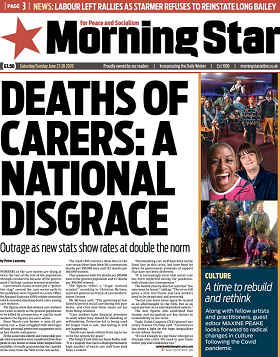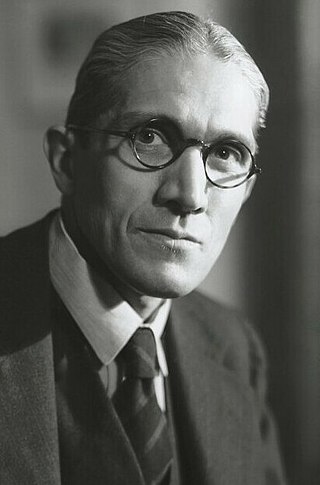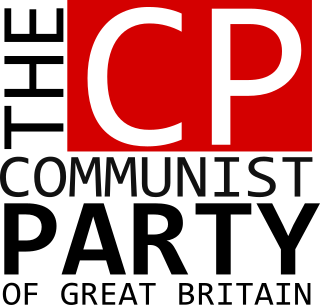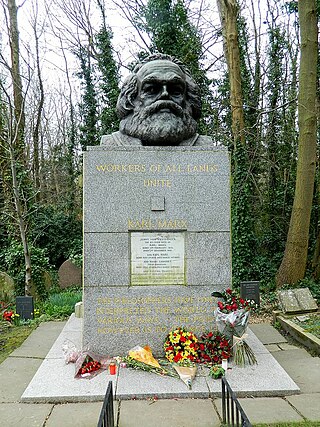Related Research Articles

The Morning Star is a left-wing British daily newspaper with a focus on social, political and trade union issues. Originally founded in 1930 as the Daily Worker by the Communist Party of Great Britain (CPGB), ownership was transferred from the CPGB to an independent readers' co-operative, the People's Press Printing Society, in 1945 and later renamed the Morning Star in 1966. The paper describes its editorial stance as in line with Britain's Road to Socialism, the programme of the Communist Party of Britain.

Rajani Palme Dutt, generally known as R. Palme Dutt, was a leading journalist and theoretician in the Communist Party of Great Britain, and briefly served as its fourth general secretary during World War II from October 1939 to June 1941. His classic book India Today heralded the Marxist approach in Indian historiography.

The Workers' Socialist Federation was a socialist political party in the United Kingdom, led by Sylvia Pankhurst. Under many different names, it gradually broadened its politics from a focus on women's suffrage to eventually become a left communist grouping.

Thomas Henry Wintringham was a British soldier, military historian, journalist, poet, Marxist, politician and author. He was a supporter of the Home Guard during the Second World War and was one of the founders of the Common Wealth Party.

Harpal Brar is an Indian communist politician, writer and businessman, based in the United Kingdom. He is the founder and former chairman of the Communist Party of Great Britain (Marxist–Leninist), a role from which he stood down in 2018.
Straight Left was a left-wing newspaper published from 1979. The phrase was also the generic name given to a political faction of the Communist Party of Great Britain who disagreed with the leadership's emerging Eurocommunist politics, and were responsible for the production of the newspaper. The origins of this faction within the CPGB go back earlier, but it emerged under this name in 1977.

Shapurji Dorabji Saklatvala was a communist activist and British politician of Indian Parsi heritage. He was the first person of Indian heritage to become a British Member of Parliament (MP) for the UK Labour Party and was also among the few members of the Communist Party of Great Britain (CPGB) to serve as an MP.

Andrew Rothstein was a British journalist. A member of the Communist Party of Great Britain (CPGB), Rothstein was one of the leading public faces of the British Communist movement, serving as a member of the CPGB's political apparatus and through a series of publications and translations of Marxist-related topics.
Zelda Kahan was a British communist.
The Workers' Weekly was the official newspaper of the Communist Party of Great Britain, established in February 1923. The publication was succeeded by Workers' Life in January 1927 following a successful libel action against the paper. This was in turn replaced by The Daily Worker on the first day of January 1930.

The British Socialist Party (BSP) was a Marxist political organisation established in Great Britain in 1911. Following a protracted period of factional struggle, in 1916 the party's anti-war forces gained decisive control of the party and saw the defection of its pro-war right wing. After the victory of the Bolshevik Revolution in Russia at the end of 1917 and the termination of the First World War the following year, the BSP emerged as an explicitly revolutionary socialist organisation. It negotiated with other radical groups in an effort to establish a unified communist organisation, an effort which culminated in August 1920 with the establishment of the Communist Party of Great Britain. The youth organisation the Young Socialist League was affiliated with the party.

The Communist Party of Great Britain (CPGB) was the largest communist organisation in Britain and was founded in 1920 through a merger of several smaller Marxist groups. Many miners joined the CPGB in the 1926 general strike. In 1930, the CPGB founded the Daily Worker. In 1936, members of the party were present at the Battle of Cable Street, helping organise resistance against the British Union of Fascists. In the Spanish Civil War, the CPGB worked with the USSR to create the British Battalion of the International Brigades, which party activist Bill Alexander commanded.

Robert Dunstan was a British doctor and political activist.
Jack Villiers Leckie was a Scottish communist activist.
Frederick Harold Peet was a British communist activist.

Far-left politics in the United Kingdom have existed since at least the 1840s, with the formation of various organisations following ideologies such as Marxism, revolutionary socialism, communism, anarchism and syndicalism.
Katharine Wise Wintringham was an American political activist, best known for her activities in the United Kingdom.

Benjamin Francis Bradley (1898–1957) was a leading British communist and trade unionist who was accused of attempting to overthrow the British colonial authorities in India, leading to him being sentenced in the Meerut Conspiracy Trial. His imprisonment in 1929 provoked an enormous outcry, and in Britain, according to Stephen Howe, "probably inspired more left-wing pamphlet literature than any other colonial issue between the wars". He was also a key member of the Communist Party of Great Britain (CPGB).
Stanley R. Broadbridge was a British trade unionist, author, and political activist.
Arthur Essex Edgeworth Reade was a British labour movement activist, whose affiliations ranged from Trotskyism to the National Labour Organisation.
References
- ↑ Playford, J. D. (1963). "Labour Monthly (London), 1921-1962". Labour History. Australian Society for the Study of Labour History (5): 57–59. doi:10.2307/27507733. JSTOR 27507733.
- ↑ Hugh Purcell & Phyll Smith, Last English Revolutionary, 2012 LSE/Sussex Academic Press.
- 1 2 3 4 Vernon, Hilda (February 1979). "Pat Sloan". Labour Monthly: 60.